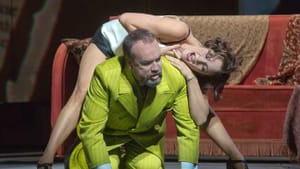Stay in the Loop
BSR publishes on a weekly schedule, with an email newsletter every Wednesday and Thursday morning. There’s no paywall, and subscribing is always free.
A decadent opera by a civilized man
The Metropolitan Opera's 'Lulu'

Alban Berg’s only two operas, Wozzeck and Lulu, are filled with depravity, sex, and bloodshed. Audiences and critics have denounced them as sordid and pornographic. Since the composer chose his subjects and wrote his own librettos as well as the music, you might assume that Berg was a man with dark obsessions.
On the contrary, Berg, who spoke perfect English, was aristocratic, sophisticated, and charming. Though he had an extramarital affair, and his wife knew about it, there were no scandals or violence. He did not associate with criminals or prostitutes, as the characters in Lulu do. That assessment is confirmed by Karen Monson and Willi Reich in their respective Berg biographies.
This new production of Lulu displays as many images of the composer as of Lulu. William Kentridge set this production in Berg’s time, the 1920s, and used Weimar-era German art. This might lead the viewer to believe the opera is an extension of Berg’s biography, but this certainly was not the case.
Instead, Berg was intellectually intrigued by the writings of Frank Wedekind (the author of Spring Awakening, Earth Spirit, and Pandora’s Box) and set two of Wedekind’s Lulu stories to music, for which he mixed some traditions of old Viennese composers, like Brahms, with the new atonality of his mentor, Arnold Schoenberg. Berg’s music has such unusual rhythmic relationships and harmonic ingenuity that listeners accustomed to simpler music might balk. Early critics called it cacophony. It’s brainy music, much of it subtle, revealing its beauty only with repeated hearings.
A temptress destroyed
Lulu is the story of an attractive young woman who leads a series of admirers to their destruction before she is in turn killed by Jack the Ripper. The drama, like the music, is more intellectual than lurid. We observe the tragedy of Lulu’s life without developing empathy for her, or for her avaricious suitors and hangers-on. When Lulu has her throat cut in the final scene, we don’t feel personal grief — we feel that the drama has reached an inevitable and satisfying conclusion.
To be sure, Berg’s music includes romanticism and expresses despair over a lost way of life, which reflects the feelings of many Austrians at the end of the Hapsburg Empire. The score also includes moments of humor, such as a last-act scene of stock market speculators losing their life’s savings, observed comically. Similarly, a dramatic moment in Act II is given a darkly comic twist: Lulu has shot and killed her husband Schön and is about to have sex with his son, Alwa. She pauses to observe, “Isn’t this the sofa where your father bled to death?” and Alwa calmly responds, “That doesn’t affect me.”
A dramatic progression with jagged music
Lulu’s story arc proceeds dramatically from the high life to a whorehouse. This dramatic progression, and the jagged music that accompanies it, was handled with intensity and considerable beauty by the German soprano Marlis Petersen. Dr. Schön (Danish bass-baritone Johan Reuter) found Lulu on the streets as a teenager and made her his mistress before marrying her. Alwa (American tenor Daniel Brenna) is a composer who is dependent on her even as she cheats on him. The Painter (tenor Paul Groves) tries to capture Lulu on canvas in a series of Expressionist portraits and sexually explicit sketches.
Mezzo Susan Graham is superb as the lesbian Geschwitz, who is devoted to Lulu. Martin Winkler is impressive as the Animal Trainer who opens the opera and also as the Acrobat who recruits Lulu to prostitution. The last scene has many of the male characters return in different guises (played by the same men) as customers of Lulu, ending with Schön, reincarnated as Jack the Ripper.
Kentridge used images of scraps of newspaper, those sexually explicit sketches, and Rorschach blobs of ink. The newsprint was probably an allusion to tabloid journalism, the profession of Schön. All this was fascinating but excessive; I wanted to concentrate more on the characters and the orchestra, which was powerful at key moments and lyrical at other times. German maestro Lothar Koenigs did a marvelous job of interpreting this complex score.
The enduring fascination of Lulu
I could devote at least two more columns to other aspects of Lulu. One would compare and contrast this version with the silent movie starring Louise Brooks; the two-act version of the opera that was staged for years; and Berg’s Lulu Suite for orchestra and soprano, which was performed by the Philadelphia Orchestra in May 2013. I could also write a thesis on Berg’s extramarital affair, tying it to a group of notes that he used in several compositions, allegedly including Lulu. But these would be unnecessary distractions from the real story: what a gripping piece of musical theater Lulu is!
What, When, Where
Lulu. Opera with music and libretto by Alban Berg. Production by William Kentridge; Lothar Koenigs conducting. Through December 3, 2015 at the Metropolitan Opera at Lincoln Center, New York. 212-362-6000 or metopera.org. (The trailer is here.)
Encore movie theater telecast, December 2, 2015. fathomevents.com.
Sign up for our newsletter
All of the week's new articles, all in one place. Sign up for the free weekly BSR newsletters, and don't miss a conversation.

 Steve Cohen
Steve Cohen